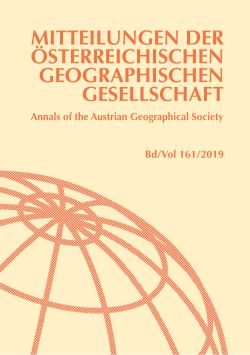
Mitteilungen der Österreichischen Geographischen Gesellschaft Band 161/2019, pp. 117-160, 2020/03/24
Band 161 (Jahresband), Wien 2019
Volume 161 (Annual volume), Vienna 2019

More than ever before, today’s cities are significantly multi-cultural and heterogeneous. Intrinsically, the modern city centre is the most easily recognisable urban area by both locals and visitors or tourists, due to a concentration of significant functions. In this paper, we discuss the physical and historic centre of Cluj-Napoca, the place that exhibits distinctive structural and functional features and which, throughout history, was shaped and adapted to different ages and needs. As a result, it is the most refined and monumental cultural landscape, granting the city a strong identity and a space rich in cultural significances. Analysing the cultural landscape of these spaces from a past, present and future perspective, it is necessary to emphasise the link between the users’ perception of the city centre and the “cold demarcation”, through official urban planning, based mainly on quantitative data and on urban indicators (e.g. consistency of the built space, buildings height, proportion between inhabited space and the organised one, accessibility, urban connectivity, etc.). Quite a lot of times, urban planning ignores users’ perceptions, being focused on businesses and ensuring people’s daily needs and not necessarily on preserving or creating symbolic places, which inhabitants are attached to and where they feel “at home”. Therefore, our aim is to highlight the cultural significance of the public spaces within the city centre of Cluj-Napoca and to assess users’ perceptions of these places more and more altered and affected by globalisation spaces. We used the results of two questionnaire surveys and of an extensive research on the history and present features of these spaces. The first survey consisted of 150 filled-in questionnaires designed to set the perceived limits of Cluj-Napoca central area and, the second one, with 300 filled-in questionnaires, aimed to establish the inhabitants’ perceptions of the public squares’ aesthetics and functionality. Many cities are part of or head towards the so-called cultural vacuum, mainly a result of a profound globalisation and of interpreting culture itself in a wrong way. One more reason for such research approaches to be welcomed and up to date.
Keywords: Cultural landscapes, public spaces, central area, spatial identity, functionality, hybrid places